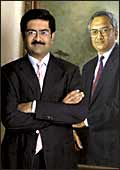|
 Days
after UK mobile services giant Vodafone announced it would pick
up a 10 per cent stake in Sunil Mittal's Bharti Tele-Ventures
(BVTL) for an eye-popping $1.5 billion (Rs 6,750 crore), Spanish
telecommunications operator Telefonica agreed to buy O2 PLC, a
UK mobile company, for £17.7 billion (Rs 1,41,600 crore).
The acquisition of o2, which has been a star performer in the
European mobile telephony space for the past three years, enables
Telefonica to further expand its footprint across Europe-earlier
in 2005, the Spanish corporation had taken over Czech operator
Cesky Telekom. Days
after UK mobile services giant Vodafone announced it would pick
up a 10 per cent stake in Sunil Mittal's Bharti Tele-Ventures
(BVTL) for an eye-popping $1.5 billion (Rs 6,750 crore), Spanish
telecommunications operator Telefonica agreed to buy O2 PLC, a
UK mobile company, for £17.7 billion (Rs 1,41,600 crore).
The acquisition of o2, which has been a star performer in the
European mobile telephony space for the past three years, enables
Telefonica to further expand its footprint across Europe-earlier
in 2005, the Spanish corporation had taken over Czech operator
Cesky Telekom.
Even as European wireless giants scramble
to consolidate their operations within the continent, there's
a billion-dollar question now being asked in global investment
banking circles. Post Vodafone's re-entry into India, how long
will it be before operators like Sistema, Telenor, France Telecom-and
Telefonica- make their intentions clear for the world's fastest
growing wireless market? As Manisha Girotra, MD & Chairperson
(India), UBS Securities (which represented Vodafone in the deal
with Bharti), points out, the European operators have little option
but to be in India. "The demographics work well for them,
with the 18-25 age group being a huge population. Besides, the
3g problems are over in Europe and the next story will have to
be Destination India," she states.
 |
| Right note: Bharti's Sunil Mittal (R)
and Vodafone's Arun Sarin after signing an eye-popping $1.5
billion (Rs 6,750 crore) deal |
To be sure, there are many who agree with
that line of thinking, encouraged no doubt by the policy initiatives
taken by the government for the telecom sector, the latest being
an increase in the limit on foreign direct investment to 74 per
cent. And if the Europeans are looking at India very closely,
two huge triggers have prompted that interest. One is the near-saturation
levels prevailing in European markets. And two, the conviction
that Indian telecom has finally come of age, with the Bharti-Vodafone
deal contributing in no small measure in reinforcing that belief.
Explains Munesh Khanna, Managing Director, N.M. Rothschild India:
"One would have expected it (a deal of such magnitude) to
come from a place like China. This deal only proves that the levels
of interest in India have certainly increased from the perspective
of the players in Europe."
 |
"Today, one cannot
have a (telecom) strategy that is rigid and etched in stone"
K.M. Birla
Chairman/AV Birla Group |
At the same time, the options for the European
players are fairly limited with some of their markets having penetration
levels in excess of 90 per cent. Stagnant revenues per user compound
that problem. Against such a bleak backdrop, entry into newer
markets is vital. Sure, but why India? According to Kishor Chaukar,
Managing Director, Tata Industries, the growth in the Indian market-about
35 per cent in 2005 so far-is clearly one huge contributor to
the interest in the Indian market. "India is a huge market,
and there's also stability on the regulatory front," he points
out. It also helps that most domestic players aren't doing do
badly for themselves in this capital-guzzling business. According
to Enam Financial Consultants' Co-Head Investment Banking, Mahesh
Chhabria, operators are demonstrating healthy cash flows and there
have been high-quality network rollouts. "India has major
positives like the highest per minute usage rates and the lowest
tariffs. With operators looking to provide more value-added services,
there is ample scope for more money to flow in," he explains.
 |
"India is a huge market,
and there's also stability on the regulatory front"
Kishor Chaukar
MD/ Tata Industries |
Clearly a newer and a more conducive environment
has augured well for Indian telecom. As av Birla Group Chairman
Kumar Mangalam Birla told BT recently: a lot of the regulatory
overhang has been cleared. That has contributed to his group deciding
to do a rethink on telecom as a business. "We were in exit
mode and under the new circumstances, we thought it made sense
to keep telecom as a strategic business. Today, one cannot have
a strategy that is rigid and etched in stone. It has to be flexible,"
he states. The AV Birla Group has, in the process, decided to
increase its holding in cellular major Idea Cellular to over 50
per cent from the earlier level of 33 per cent.
So, who are the most likely suitors? Russian
operator Sistema comes readily to mind, as it has come close to
clinching a deal in India on more than one occasion. It was one
of the bidders when Cingular Wireless put its 33 per cent stake
in Idea Cellular on the block; Sistema had also offered to acquire
a 49 per cent stake in the C. Sivasankaran-promoted Aircel for
a whopping $450 million (Rs 2,025 crore). Both the proposed acquisitions
never saw the light of day, but as the buzz in investment banking
circles indicates, those aborted bids haven't resulted in India
dropping off Sistema's radar.
The case of Telenor is interesting. This Norwegian
major, apart from a presence in its home country, operates in
Denmark, Ukraine, Hungary and Malaysia. It also has a presence
in neighbouring Bangladesh and will soon commence services in
Pakistan. Going by that geographical spread, India would be hard
to leave out. Here too, the news is that India is being seriously
considered and it could just be a question of time before it comes
in. The other players who are scouting around for buyouts in India
are said to be France Telecom and Telefonica.
| WHY TELECOM EUROPE IS KEEN ON DESTINATION
INDIA |
 »
India is the fastest growing market in the
world »
India is the fastest growing market in the
world
»
Quick movement to the CPP regime
»
European home markets are saturated with slow growth in revenues
»
India could just be the next big 3G story |
Any potential acquirer wouldn't want to wait
too long before taking the plunge into India, given that valuations
aren't getting cheaper. The Bharti-Vodafone deal placed Bharti's
valuation at $17 billion (Rs 76,500 crore)-(same time last year,
Bharti's market capitalisation was Rs 29,600 crore while it is
over Rs 63,000 crore today)-and this could result in other players,
including regional operators like Aircel and Spice, commanding
a premium. Of course, the chances of Spice and Aircel being gobbled
up by a pan-India operator such as Bharti or Hutch or Idea-rather
than any of the global predators-are pretty strong. Aircel came
close to sealing a deal with Hutch as it did with Sistema. The
need for the smaller operators to sell out comes largely from
their inability to expand their presence to more circles as they
aren't in a position to rustle up the huge capital needed for
such growth.
Other than India, China-the largest mobile
market after the us where it is not easy to invest because of
stricter regulations-would be a logical country foreigners should
be eyeing, but from a domestic standpoint, India has its advantages.
Regulations, point out bankers, are more sympathetic towards the
operators. In 10 years of wireless telephony, India has managed
to bring in the Calling Party Pays (CPP) regime quite effortlessly.
(China does not have a CPP regime.) Small wonder then over the
last couple of years, Indian operators have been consistently
logging in over two million subscribers each month. The policy
to allow a foreign operator to hold 74 per cent in an Indian telecom
corporation is the cherry on the cake. "The increase in fdi
will become an added incentive," avers Chaukar. So, who's
it going to be after Vodafone? Watch this space.
|




 D
D


 »
India is the fastest growing market in the
world
»
India is the fastest growing market in the
world